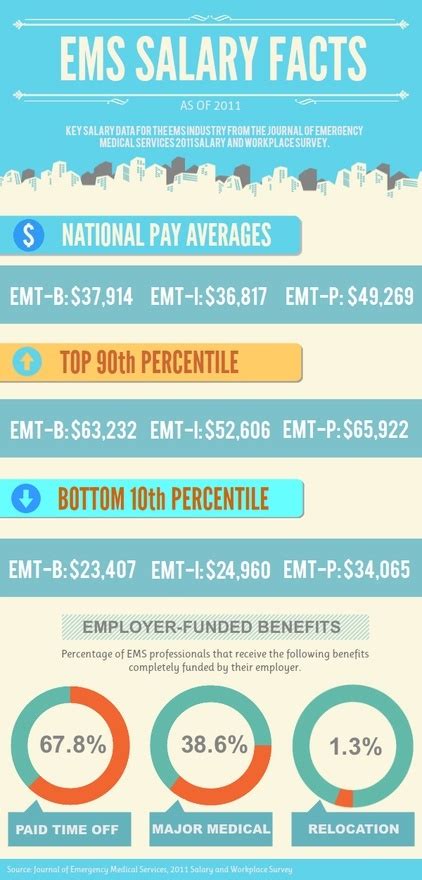Welcome to our latest blog post where we delve into the world of emergency medical technician (EMT) salaries. If you’re considering a career in emergency medical services or are already working as an EMT, understanding the earning potential in this field is crucial. In this comprehensive guide, we will explore the various factors that affect EMT salaries, including experience, certification levels, and geographical variations. We’ll also take a closer look at the salary range for entry-level EMTs and compare EMT salaries to other healthcare professions. Additionally, we’ll examine the differences between private and public sector EMT salaries and discuss opportunities for EMTs to increase their earnings. Lastly, we’ll touch on the future outlook for EMT salaries in the ever-evolving healthcare industry. So, if you’re curious about the financial aspect of a career in emergency medical services, keep reading for all the relevant information you need.
Table of Contents
Overview of EMT salaries
EMT (Emergency Medical Technician) salaries can vary widely depending on a number of factors. These factors include experience, level of certification, geographical location, and whether an EMT works in the private or public sector. Despite these variations, EMTs generally earn a competitive salary for their important and demanding work in the healthcare industry.
Factors that can affect EMT salaries
One of the main factors that can impact an EMT’s salary is their level of experience. EMTs with more years of experience typically command higher salaries, as their expertise and ability to handle a wide range of emergencies increases with time. Another significant factor is the level of certification an EMT holds. Advanced certifications and additional training can lead to higher earning potential, as they demonstrate a higher level of skill and expertise.
Geographical variations in EMT salaries
Salaries for EMTs can also vary significantly depending on the region in which they work. Urban areas and regions with high demand for emergency medical services may offer higher salaries to attract and retain qualified EMTs. Additionally, cost of living and overall economic conditions can influence the salaries offered to EMTs in different locations.
Factors affecting EMT salaries
There are a variety of factors that can impact the salaries of EMTs in the healthcare industry. One of the most significant factors is the level of experience that an EMT has. EMTs with more years of experience tend to earn higher salaries, as they have developed their skills and knowledge over time.
Another important factor is the level of certification that an EMT holds. EMTs with advanced certifications, such as Paramedic or Critical Care EMT, often earn higher salaries than those with basic certifications. The level of education and training required for these advanced certifications can also play a role in salary differences.
Geographical location is also a major factor that affects EMT salaries. EMTs working in urban areas or areas with a high cost of living generally earn higher salaries than those working in rural or less populated areas. The demand for EMT services and the cost of living in a specific location can greatly impact salary ranges.
Lastly, the type of employer can also influence EMT salaries. EMTs working for private ambulance companies or hospitals may have different salary structures compared to those working for public sector entities, such as fire departments or government-run EMS agencies. The benefits, overtime pay, and scheduling policies can vary between employers, affecting overall compensation for EMTs.
Importance of experience in EMT salary
Experience plays a crucial role in determining the salary of an EMT. As EMTs gain more experience in the field, their skills and knowledge develop, leading to increased competency in handling emergency medical situations. This enhanced level of expertise is typically rewarded with higher compensation as employers value the practical experience and proven track record of seasoned EMTs.
Moreover, experienced EMTs are often entrusted with more complex cases and have the ability to make critical decisions under pressure, which further justifies the higher salary they command. Their past encounters with diverse medical scenarios enable them to provide a higher level of care and exhibit confidence in their job, both of which are highly valued attributes in the emergency medical services sector.
Additionally, the experience gained by EMTs over the years allows them to build a network of professional connections and earn the trust of their colleagues and superiors. This network and reputation can open up avenues for career advancement and even potential opportunities for increased earnings through promotions or specialized roles within the EMS field.
Overall, the significance of experience in determining an EMT’s salary cannot be overstated. It not only reflects their growth and proficiency in the field but also serves as a measure of their contribution to the healthcare community and the value they bring to their roles as emergency medical technicians.
Different levels of EMT certification and their impact on earnings
Different levels of EMT certification and their impact on earnings
EMTs, or Emergency Medical Technicians, are important frontline healthcare providers who are responsible for providing initial medical care to patients in emergency situations. EMTs can have different levels of certification, which can impact their earnings and job responsibilities.
One level of EMT certification is EMT-Basic, which is the entry-level certification. EMT-Basics typically earn lower salaries compared to higher-level EMTs, as they have less training and can perform fewer medical procedures. However, EMT-Basics are still crucial members of a healthcare team and play a vital role in emergency medical care.
The next level of EMT certification is EMT-Intermediate, which requires additional training and allows EMTs to perform more advanced medical interventions. EMT-Intermediates typically earn higher salaries compared to EMT-Basics, reflecting their increased skill level and ability to provide more comprehensive care to patients.
The highest level of EMT certification is EMT-Paramedic, which requires the most training and allows EMTs to perform the most advanced medical procedures, such as administering medications and providing advanced airway management. EMT-Paramedics command the highest salaries among EMTs, reflecting their extensive training and ability to provide the highest level of prehospital care.
Salary range for entry-level EMTs
Entry-level EMTs can expect to earn a starting salary that falls within a certain range, depending on several factors. In general, the annual salary for entry-level EMTs can range from $20,000 to $35,000. This range can vary based on the geographical location of the job, the type of employer, and the level of experience of the EMT.
One of the primary factors that can impact the salary range for entry-level EMTs is the location of the job. EMTs working in urban areas or in areas with a high demand for healthcare services may earn more than those working in rural or less densely populated areas. Additionally, the cost of living in a particular location can also influence EMT salaries, as areas with a higher cost of living tend to offer higher salaries to compensate for the increased expenses.
Another important consideration is the type of employer that an entry-level EMT works for. EMTs employed by private ambulance services, hospitals, or other healthcare facilities may receive higher salaries compared to those working for public ambulance services. The benefits and opportunities for advancement may also differ between employers, which can impact the overall compensation package for entry-level EMTs.
Finally, the level of experience can play a significant role in determining the salary range for entry-level EMTs. EMTs with little to no prior experience may start at the lower end of the salary range, while those with additional certifications, training, or relevant work experience may start at a higher salary. As entry-level EMTs gain more experience and skills, they may have the opportunity to negotiate higher salaries or seek out more lucrative job opportunities.
Salary comparison between EMTs and other healthcare professions
When comparing salaries between EMTs and other healthcare professions, it’s important to consider the level of education and training required for each. EMTs typically have a shorter training period compared to professions such as nurses or physicians, which can result in a lower starting salary. However, EMTs also have the opportunity to advance their certification and gain experience, which can lead to increased earnings over time.
Many healthcare professions require a bachelor’s or advanced degree, which typically results in a higher starting salary compared to EMTs. However, the level of responsibility and scope of practice may also be greater for these professions, which can justify the difference in pay.
It’s also important to consider the demand for each profession in a given geographical area. While some areas may have a higher demand for EMTs, resulting in competitive salaries, other areas may have a greater need for certain healthcare professions such as nurses or specialists, leading to higher pay in those fields.
Overall, the salary comparison between EMTs and other healthcare professions ultimately comes down to the level of education, training, scope of practice, and demand for each profession in a given area.
Geographical variations in EMT salaries
EMT salaries can vary widely depending on the geographical location of the job. Cost of living and demand for EMT services are two factors that contribute to these differences. In cities with high living expenses, EMTs may be paid higher wages to offset the increased cost of necessities such as housing and groceries.
In contrast, rural areas may have a lower demand for EMT services, resulting in lower salaries for those positions. Additionally, the availability of medical facilities and resources can impact EMT salary. Areas with limited healthcare facilities may need to pay higher wages in order to attract and retain qualified EMTs.
Some states may have regional differences in salary due to variations in local regulations and healthcare funding. For example, certain states may have higher budget allocations for emergency medical services, leading to higher wages for EMTs working in those areas.
Overall, it’s important for EMTs to consider the geographical variations in salary when choosing a location for employment. Conducting research on the cost of living and demand for EMT services in different areas can help individuals make informed decisions about their career paths.
Private vs. public sector EMT salaries
When it comes to EMT salaries, one important factor to consider is whether you are working in the private sector or the public sector. There are significant differences in pay, benefits, and job outlook between these two sectors, which can have a major impact on your earning potential as an EMT.
Private sector EMTs often work for private ambulance companies or other private healthcare providers. These positions may offer higher salaries and better benefits compared to public sector roles. Private sector EMTs may also have more opportunities for advancement and career growth, as well as access to cutting-edge technologies and training programs.
On the other hand, public sector EMTs typically work for government agencies, fire departments, or other public institutions. While public sector EMTs may have more stable job security and access to retirement benefits, their salaries may be lower compared to those in the private sector. Additionally, public sector EMTs may face more bureaucratic red tape and limited resources, which can impact job satisfaction and overall earning potential.
Ultimately, the decision to work in the private or public sector as an EMT depends on your individual career goals, lifestyle preferences, and priorities. It’s important to carefully weigh the pros and cons of each sector before making a decision, as it can have a significant impact on your long-term earning potential and overall career satisfaction.
Opportunities for EMTs to increase their earnings
One of the main opportunities for EMTs to increase their earnings is by pursuing further education and obtaining additional certifications. By continuing their education and obtaining advanced certifications, EMTs can expand their skills and knowledge, making them more valuable to employers and increasing their earning potential.
Another opportunity for EMTs to increase their earnings is by seeking out overtime and additional shifts. Many EMTs have the option to work extra shifts or overtime hours, which can significantly boost their income over time. Additionally, some EMTs may have the option to take on special assignments or projects that come with higher pay rates.
EMTs can also explore opportunities for career advancement within their organizations or by seeking employment with organizations that offer higher salaries for more experienced or specialized EMTs. With more experience and specialized skills, EMTs can qualify for higher-paying positions such as paramedic or supervisor roles.
Lastly, EMTs can also consider exploring opportunities for working in different settings or locations that offer higher salaries or better benefits. For example, some EMTs may find that working in a private medical facility or in a different geographical area can lead to increased earnings and better benefits compared to their current position.
Future outlook for EMT salaries in the healthcare industry
As the healthcare industry continues to evolve, the future outlook for EMT salaries is optimistic. With advancements in technology and an aging population, the demand for emergency medical services is expected to increase, leading to a rising need for qualified EMTs. This growing demand is likely to result in higher salaries for EMTs as healthcare organizations compete to attract and retain top talent in the field.
Additionally, the emphasis on providing quality emergency care and reducing response times is driving the need for well-trained and experienced EMTs. As a result, EMTs with specialized training and certifications, such as paramedic or flight EMT, are likely to command higher salaries due to their advanced skill sets and ability to handle complex medical situations.
Furthermore, as the healthcare industry shifts towards value-based care and preventive measures, EMTs are being recognized for their role in promoting community health and wellbeing. This increased recognition and appreciation for the work of EMTs may lead to a rise in salaries as their contributions to the healthcare system are valued and acknowledged.
Overall, the future outlook for EMT salaries in the healthcare industry appears promising, with opportunities for career advancement, specialization, and increased earning potential. As the demand for emergency medical services continues to grow, EMTs can expect to see favorable salary trends and a rewarding career path in the coming years.






